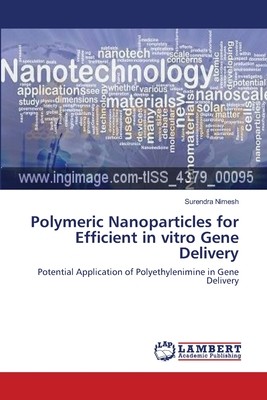
- We will send in 10–14 business days.
- Author: Surendra Nimesh
- Publisher: LAP Lambert Academic Publishing
- ISBN-10: 3659104574
- ISBN-13: 9783659104572
- Format: 15.2 x 22.9 x 0.9 cm, minkšti viršeliai
- Language: English
- SAVE -10% with code: EXTRA
Polymeric Nanoparticles for Efficient in vitro Gene Delivery (e-book) (used book) | bookbook.eu
Reviews
Description
With the continuous influx of knowledge about the role of genes involved in acquired or hereditary diseases, the delivery of regulatory genes or nucleic acids into affected cells is a potentially promising strategy. During the past few decades, a large number of systems have been explored to modify the biodistribution and bioavailability of biomolecules by using carrier systems such as liposomes, micelles and nanoparticles. Amongst various nanoparticles prepared from polycationic polymers, polyethylenimine (PEI) takes a prominent position due to its high transfection efficiency owing to its endosomal escape potential. To date, a large number of studies regarding incorporation of modifications into PEI to improve upon the gene transfer efficacy have been proposed. However, the problems of toxicity and poor gene delivery efficiency associated with PEI poses a major hurdle for in vivo studies. The work embodied in thesis started with the purpose of incorporating suitable modifications into PEI to improve in vitro transfection efficiency and cell viability. Suitable chemical modifications resulted in several folds improvement in transfection efficiency and reduction in cytotoxicity.
EXTRA 10 % discount with code: EXTRA
The promotion ends in 23d.16:35:00
The discount code is valid when purchasing from 10 €. Discounts do not stack.
- Author: Surendra Nimesh
- Publisher: LAP Lambert Academic Publishing
- ISBN-10: 3659104574
- ISBN-13: 9783659104572
- Format: 15.2 x 22.9 x 0.9 cm, minkšti viršeliai
- Language: English English
With the continuous influx of knowledge about the role of genes involved in acquired or hereditary diseases, the delivery of regulatory genes or nucleic acids into affected cells is a potentially promising strategy. During the past few decades, a large number of systems have been explored to modify the biodistribution and bioavailability of biomolecules by using carrier systems such as liposomes, micelles and nanoparticles. Amongst various nanoparticles prepared from polycationic polymers, polyethylenimine (PEI) takes a prominent position due to its high transfection efficiency owing to its endosomal escape potential. To date, a large number of studies regarding incorporation of modifications into PEI to improve upon the gene transfer efficacy have been proposed. However, the problems of toxicity and poor gene delivery efficiency associated with PEI poses a major hurdle for in vivo studies. The work embodied in thesis started with the purpose of incorporating suitable modifications into PEI to improve in vitro transfection efficiency and cell viability. Suitable chemical modifications resulted in several folds improvement in transfection efficiency and reduction in cytotoxicity.


Reviews